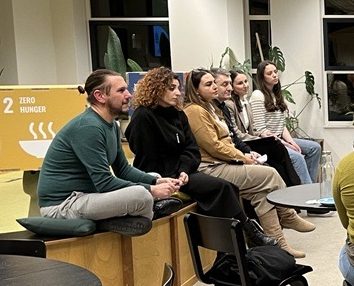
Fellows from the Global Network of Women Peacebuilders sharing Intersectional Insights from NGOs Advancing Youth, Feminist, and Human Rights-Based Perspectives.
In February 2024, fellows from the Global Network of Women Peacebuilders’ Building Resilience in the Eastern Neighbourhood programme were in The Hague to learn from the work of organisations such as CIVIC and Justice & Peace in the city of international peace and justice. The Hague Humanity Hub connected them with relevant community organisations and invited four fellows to join an edition of the Fireside Peace Chats. Fireside Peace Chats are an avenue for practice, research and policy in peacebuilding to come together in an informal way through the experience of people on the ground. Highlighting the personal stories of peacebuilders with extensive experience from conflict-affected environments, we wish to contribute to a locally informed paradigm shift in liberal peacebuilding.
The peacebuilders each shared their experiences from their NGOs working in Azerbaijan, Armenia, Georgia and Moldova respectively. They reflected on the opportunities and civic spaces for NGOs to educate and engage primarily young people from these countries in an often difficult political climate. While they have different experiences working with issues relating to youth, feminism and human rights, they share the view that “Peace is hard to achieve and easy to lose”, which emphasises the need for their continued efforts at enabling inclusive and diverse safe spaces for citizens as a practice of peacebuilding.
Shushanna Hasasyan from Pink Armenia, an organisation working to create safe spaces for LGBTQ+ communities, reflected on how their mission has become a question of justice for her. Many of the people who engage with the organisation have undergone horrible conversion practices and need assistance in healing. By providing this assistance through tolerance and love, the work of Pink Armenia is an avenue towards peacebuilding. Shushanna emphasised how Pink Armenia has become a space to learn about questions related to sexual health and sexuality as formal institutions refrain from these crucial topics.
Maryam Majidova from Gender Hub Azerbaijan shared experiences of social stigmatisation due to widespread gender-based violence in Azerbaijan, especially in rural areas. While the organisation is not funded by the government, she emphasised that good relations with the relevant government branches is crucial to reach their target group in rural areas. Vladimer Mkervalishvili from Rights Georgia also reflected on the difficulties of interacting with the national government. Despite collaboration with the government on strategy and recommendations regarding gender issues, he experiences a harshening political climate towards human rights activists, partly due to the current Russian influence in Georgia.
Echoing many of her colleagues’ testimonies, Ana Negru from the Moldavian organisation Platform for Security and Defence Initiatives underlined the rise of misinformation and propaganda, especially targeting civil society initiatives. Like several other fellows, she highlighted the need for stakeholders – including men, women, private institutions and civil society – to unite to protect inclusive civic spaces.
The fellows all pinpointed education as the key to increasing participation and inclusion, while also mentioning the role of political will and the consequences of its decline. The speakers emphasized the need to make issues such as youth, feminism and gender, etc more mainstream to reach youth in these countries, especially in rural areas. The fellows highlighted the need to engage youth in local communities and the importance of intergenerational efforts in building relations and trust.
Lastly, the four speakers reflected on the future of their work and expressed mixed concerns due to external influence of Russia and the EU and how these geopolitical tensions affect the possibility for their respective organisations to make their voices heard.
